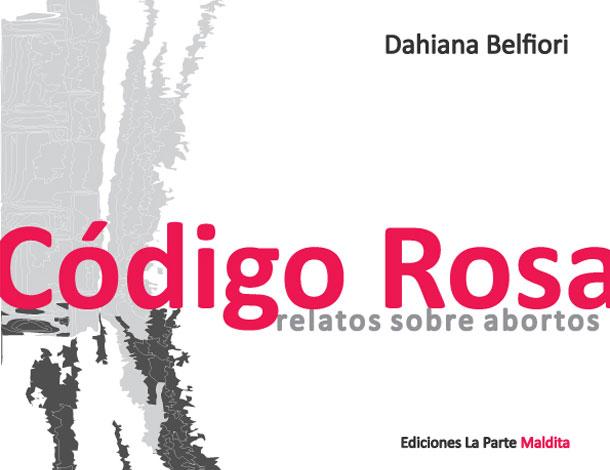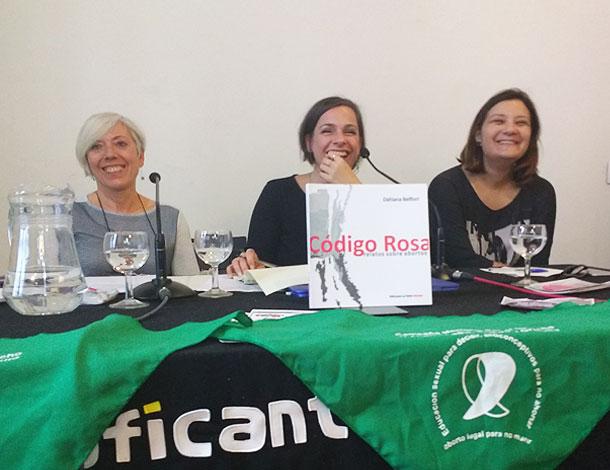The book Código Rosa. Relatos sobre abortos [Pink Code. Narratives about abortions] is a collective creation emerging out of an idea from La Revuelta Colectiva Feminista [Feminist Collective The Riot]. During 2012, the Colectiva collected testimonies from women who’d had medical abortions and who had been accompanied in that decision by the Colectiva, as part of Socorristas en Red (Feministas que abortamos) [Pink Relief Network (Feminists involved in abortions)]. AWID spoke to Dahiana Belfiori, feminist activist, member of the Pink Relief Network and author of the book.
The Argentinean context
Each year, 400 to 500 thousand clandestine abortions are performed in Argentina, and about 100 pregnant women die due to unsafe procedures. Thanks to the tireless action of feminists and activists for women’s rights, the discussion about abortion is gaining a place in society. It has also resulted in pregnant women, who need it, to be accompanied.
Since 2005, the now historical Campaña Nacional por el Derecho al Aborto Legal, Seguro y Gratuito [National Campaign for Legal, Safe and Free Abortion] has been establishing the debate in society and the media. And since 2007 it has been introducing successive bills to legalize pregnancy interruption. In June, 2016, the sixth bill for a Law of Voluntary Pregnancy Interruption was presented.
Socorristas en Red, established in 2012, “is a network of feminist groups and collectives from Argentina. Through phone and face to face meetings, they provide information and accompaniment to women who decide to have an abortion using misoprostol - a drug that allows pregnancy interruption and that can be used safely by women themselves until week 12 of pregnancy”.

From body to body, through word of mouth
By the end of 2004 the experiences of women, who decided to share what they had lived, were reaching a more public state and were being known, through web pages and feminist dialogue fora. To take the personal to a political level, the first person of the singular was used and the phrase “I had an abortion” started to be read and be heard online and in the slogans of demonstrations.
Inscribed in this history, the book Código Rosa. Relatos sobre abortos goes beyond the exposition of testimonies. Taking as a basis the stories shared with the members of the pink relief, the writing of Dahiana Belfiori helps to expand the experiences. The story of a woman who had an abortion is not the only one that can be read, but also that of an allied physician who teaches about abortion at the university.
The first person goes through the frontier, from the real to fiction, generating a powerful creative-political combination.
“By the end of 2013, the Colectiva invited me to write a book of fiction stories based on the experiences they had registered”, says Dahiana Belfiori and adds that the proposal was stimulating to her both as an activist, and as a writer, two central aspects of her life.
“As a feminist and as an activist for legal and free abortion, it challenged me in a very particular way, making think over and review those testimonies from a different perspective. I immediately understood that it was an ethical, aesthetical and political task, both unavoidable and complex, to build new narratives around the abortion experiences of those women – narratives that were different from the ones already available and socially accepted about this issue”.
As a writer, it was a challenge in many respects.
“Those who have worked with testimonies will be able to recognize the succession of small, usually unavoidable, concerns that come to us when working on the voices of other people. I asked myself how to select the most relevant parts of those real voices who so generously gave themselves to an interview, focused on a short but meaningful time and space in their lives. I asked myself which criteria should I use to decide about the point of view, about the place where the narrator situates herself. And, most important, to what extent it was legitimate to operate over those voices?”
The author tells us that she followed the powerful desire expressed by time and again by the women, who said ‘I want my testimony to be useful to others’ and that “convinced that fiction is a powerful weapon to think about the world and to create other possible worlds. I immersed myself in writing for more than a year, and that was matched by the beautiful and somewhat unsettling images created by Luis Acosta and Gisela Martino”.

The need for a debate
Throughout 2015, the author was invited to take part in more than thirty presentations of the book across Argentina, both in academic and different activist and cultural spaces, to audiences that were also very varied.
Belfiori recalls, “What I experienced was moving. I noticed a social urge for debating this issue without prejudices, and at the same time I realized that each story, each experience of a real flesh and blood woman who has had an abortion, is more powerful than the arguments opposing abortion. Those stories are even stronger than many of the arguments we feminists use when advocating for it. When experience is articulated into fiction, the result is a powerful discourse with which to address complex issues, contributing to dismantle prejudices and allowing more voices to emerge, mine included”.
While Argentina still waits for its State to fulfill its obligations on this issue - particularly ceasing to criminalize women - activists and feminists will keep mobilizing, working on projects and giving assistance to those women who need it. The book Código Rosa. Relatos sobre aborto triggers debates and is a literary work that goes beyond the mere compilation of testimonies, and that is what makes it a necessary book.
As Belfiori says, “I believe it is one more contribution to the wide concert of voices that advocate for access to legal abortion in Argentina, and in that sense the book cannot be thought of without a history, and decontextualized from other practices and discourses that point in the same direction”.
